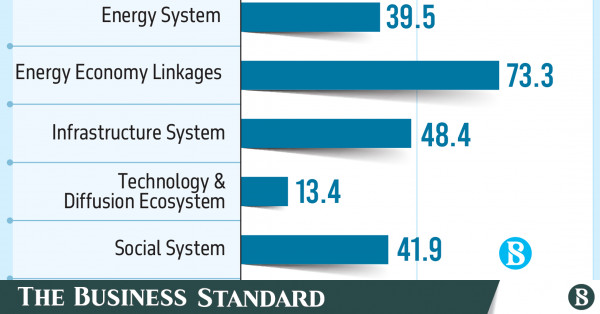Bangladesh’s regulatory environment for supporting a clean energy transition ranks as the third weakest in South Asia, ahead of only Pakistan and Afghanistan, according to a new report released yesterday by the Asian Development Bank (ADB) in collaboration with the World Economic Forum (WEF).
The report, titled “Energy Transition Readiness Assessment for Developing Asia and the Pacific”, is the ADB’s first comprehensive evaluation of regional countries’ capacity to transform their energy systems.
Using a framework based on the WEF’s Energy Transition Index, it measures countries’ preparedness across several dimensions critical for achieving sustainable energy systems.
Bangladesh scored 39.9 out of 100 in the regulatory environment category, which assesses a country’s ability to create stable, comprehensive policies necessary for a smooth energy transition.
Only Pakistan (32.1) and Afghanistan (25) scored lower among South Asian nations. Bhutan led the region with a score of 73.5, followed by India (67.3), Sri Lanka (63.9), and Nepal (58.8).
“Effective regulations align stakeholder interests, enhance governance, support modern infrastructure and innovation, ensure energy security and resilience, guide sustainable investments, minimise macroeconomic risks, and promote social equity,” the report said.
The ADB stressed that developing Asian countries must prioritise creating more conducive environments for private sector investment in clean energy, given the significant financial demands of the energy transition and limited public sector resources.
Stating the importance of energy transition, CPD’S Distinguished Fellow Dr Mustafizur Rahman said, “Bangladesh will face an adverse situation in the EU market for our garment exports if we fail to make significant progress in green energy.”
“Our carbon emission in producing power, which we are ignoring, may emerge as a prime hurdle in our future exports, as buyers will look seriously at the power use of factories along with carbon emission targets or not. We should be proactive in making the green energy transition,” he further added.
The Energy Transition Readiness Assessment (ETRA) evaluates developing Asian countries’ readiness for the energy transition, where “transition readiness” is defined as a country’s capacity and preparedness to create an equitable, sustainable, and secure energy system that builds value for society and delivers on net-zero ambitions.
The ETRA regulatory environment dimension assesses a country’s regulatory readiness to advance climate commitments, comprehensive energy policy frameworks, and governance quality, according to the report.
Countries are scored on a scale of 0 (least ready) to 100 (most ready) across seven dimensions, which are further categorized into 22 subdimensions, which comprise 61 indicators that help capture specific areas of focus.
Bangladesh’s performance across dimensions
Among the various readiness dimensions assessed, Bangladesh performed best in Energy Economy Linkages, scoring 73.3, reflecting its ability to decouple energy use from economic growth. In the Infrastructure System dimension, which covers low-carbon energy integration, energy demand management, and transport and ICT development, Bangladesh scored 48.4.
For the Social System, focusing on providing affordable energy and addressing the distributional impacts of the energy transition, Bangladesh scored 41.9.
In the Macroeconomic and Investment Environment, which measures a country’s ability to attract capital and its macroeconomic fundamentals, the country achieved a score of 40.6.
Lastly, Bangladesh scored the lowest in the Technology and Diffusion Ecosystem dimension, which gauges the capability to innovate, transfer, and deploy new energy technologies, with a score of just 13.4.
The report also emphasised that a comprehensive regulatory framework, including laws, policies, and governance mechanisms, is essential for reducing investment risks and ensuring a secure, equitable, and resilient energy transition.
While developing Asian economies generally perform well in ensuring electricity access and promoting clean cooking initiatives, they lag significantly in renewable energy and energy efficiency policies.
Most countries in the region have yet to develop second nationally determined contributions (NDCs), the report stated.
According to the report, Bangladesh has not yet submitted a second NDC or enacted a long-term climate strategy or climate framework law, underscoring critical policy gaps.
The report also highlighted broader challenges facing the region, including weak regulatory quality, limited government effectiveness, inflation, exchange rate volatility, and low sovereign credit ratings, all of which hinder investment in clean energy projects.
Investment in modernising power grids remains insufficient, constraining developing countries like Bangladesh from fully realising the benefits of an energy transition, such as improved energy security, millions of new green jobs, and expanded electricity access.
Despite these hurdles, the report noted that Asia and the Pacific remain at the forefront of a global energy transformation, offering significant opportunities if countries can strengthen policy frameworks and attract private sector investment.


